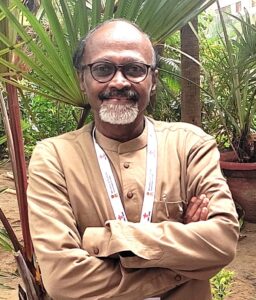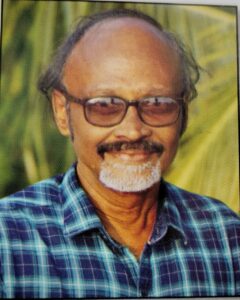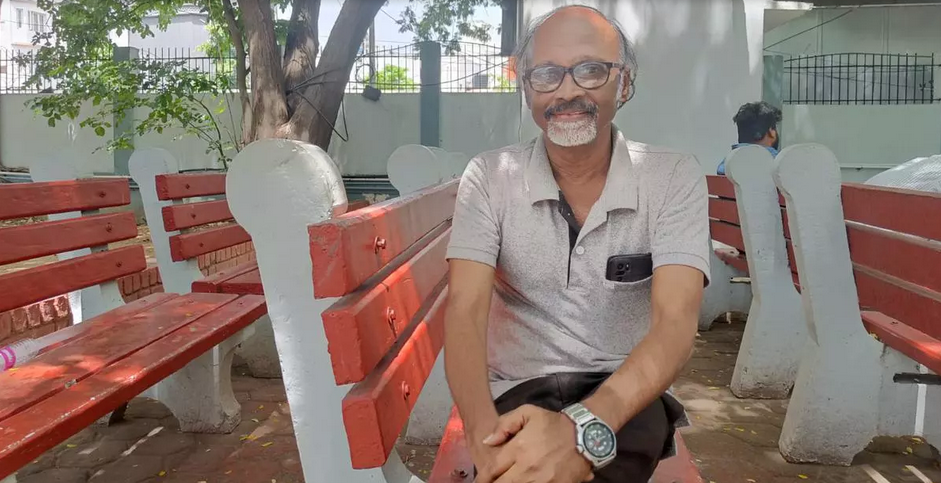
The saying “Literature is the mirror of life” perfectly captures the essence of Karisal literature. Written in Tamil, this unique genre blurs the lines between fiction and reality, reflecting the lives and struggles of people living in the black soil region of Tamil Nadu.
Karisal literature thrives on its deep connection to the region’s culture and topography. Writers like Udhayasankar, known for his masterful storytelling and deep understanding of Tamil, have significantly contributed to this genre and Tamil literature. Udhayasankar’s recent Bal Sahitya Puraskar Award, a prestigious Indian government honour, recognizes his exceptional work in shaping children’s literature in Tamil. In our conversation, we’ll delve deeper into regional and dialectical literature, its variations, and Udhayasankar’s unique approach to storytelling for young readers.
Author Udhayasankar is proud of his heritage, and this shines through in his writing, which falls under the umbrella of “Karisal literature.” Karisal means “black soil” in Tamil, and this type of literature reflects the unique experiences of people living in different regions of Tamil Nadu. Each area has its soil, agricultural practices, water sources, and jobs, that shape the culture, customs, and even dialects spoken there. Karisal literature captures these rich, local identities.
Decoding the dialectical
Dialect literature in Tamil Nadu sheds light on people’s lives in different regions. A forerunner of this movement was R. Shanmugasundaram, who wrote the first Tamil dialect novel- Nagammal (நாகம்மாள்), in the Kongu dialect. Sadly, his work wasn’t widely recognized due to his passing. Ki. Rajanarayan, considered the father of Karisal literature, played a pivotal role. He identified talented writers from Kovilpatti, a region known for its black soil, and brought their stories together. This landmark anthology featured 23 authors, giving voice to a unique community.
Early roots of reading:
Hailing from Kovilpatti, Udhayasankar discovered his love for reading at a young age, inspired by his mother. His resourcefulness shines through when he talks about his work and Tamil literature. At 19, he entered the world of writing when he met Ki. Rajanarayanan, who was working on a Karisal Dialect Dictionary. Udhayasankar’s help with the dictionary marked the beginning of his writing career, which started with poetry.
The book under the spotlight:
A prolific writer since 1980, Udhayasankar has penned over 175 books, with a special focus on children’s literature (around 130 books). Winning the Bal Sahitya Puraskar Award 2023 for his book Adhanin Bommai (ஆதனின் பொம்மை) was a significant moment for him. This unique children’s book blends history and fantasy to explore the Keezhadi excavations, a landmark archaeological discovery that sheds light on the ancient Tamil language and culture. Adhanin Bommai is not just a captivating tale, but also a valuable record of Tamil heritage, helping young readers connect with their roots.
Recognition for such a book that Udhayasankar meticulously worked on for a year adds more joy to his Sahitya Akademi award. Reminiscing it, he says, “the archaeological evidence of Keezhadi brought to light the way of life of Tamilians, 2600 years ago. I thought that children must be enlightened on this. Thus, I set to work on it for a year. When the Central Government’s Sahitya Akademi award was conferred for such a book, it was a double delight for me.” Thus, he believes that such recognitions are significant in providing the limelight to the richness of Tamil culture and his literary contributions to it.
Sharing heritage with the young generation:
Udhayasankar’s passion for sharing Tamil heritage with younger audiences was clear when discussing the differences between his book Parampin Pari (பறம்பின் பாரி) and Su. Venkatesan’s Veerayuga Nayagan Velpari (வரீயுக நாயகன் வே ள்பாரி). He explained that Venkatesan’s work portrays Pari, a king from the Sangam period, in an epic style, emphasizing his bravery, fair rule, and the flourishing Tamil society under his reign. This focus on cultural and literary achievements, as well as inclusivity, is a contrast to the author’s approach.
In his book, Udhayasankar brings the story of Pari, a teenager, to life. Through Pari’s experiences, he paints a picture of Tamil society during that era, hoping to capture the imagination of young readers. Udhayasankar feels strongly about reminding younger generations of the ancient Tamil society’s emphasis on unity and equality, regardless of caste or religion. He sees his writing as a way to champion this message.
Bringing intellectual revolution:

In a refreshing take on literary gatherings, writer Udhayasankar argues that these festivals are sparking an intellectual revolution in Tamil Nadu. By bringing literature out of Chennai and into local communities, these events are creating a whole new generation of readers. From children’s books to scholarly works, the festivals offer a vast selection, making knowledge accessible to everyone. Udhayasankar sees these gatherings as a platform for regional authors, poets, and thinkers to connect with audiences and share their culture and ideas with the world.
Udhayasankar sees regional literary festivals as a chance to boost awareness of Tamil literature’s rich variety. These festivals are relatively new, and he believes the public needs to embrace them. Highlighting the importance of reading, he says- “Reading alone can bring evolutionary changes to a society and every means must be implemented to make people understand this. Then, these kinds of literary festivals will witness the transformation of the people from mere spectator to a contributor.”
He proposes reading festivals alongside book fairs to promote reading and envisions programs in schools, and communities, along with incentives like school credit for reading and government initiatives like home library rewards, reading room accessibility, and reader recognition awards. These steps, he believes, can cultivate a culture that values reading.
Deeper understanding of regional languages:
Udhayasankar emphasizes the importance of studying lesser-known dialects, like Karisal. According to him, this research would help us appreciate the unique features of these regional variations and how they give voice to marginalized communities. He proposes establishing dedicated literary research centres for every dialect and regional language. He also encourages universities to include these dialects in their curriculum and hire professors specializing in them to educate the next generation.
Concluding his thoughts, Udhayasankar said- “Dialectical literature does not restrict itself to showcasing the diversity of language. The reality that it also exhibits the diversity of culture and lives of people is a fact that society must be made aware of.” His mission is to unveil the beauty and variations of the Tamil language through literature, sharing it with the world. Government recognition and a Sahitya Akademi award cement his reputation as a distinguished man of letters.
Note: This interview was conducted in Tamil, and the ideas and quotes of the interviewee were translated into English to achieve optimum accuracy.
Edited by: Mohammed Sajid

